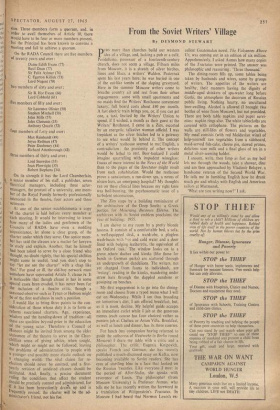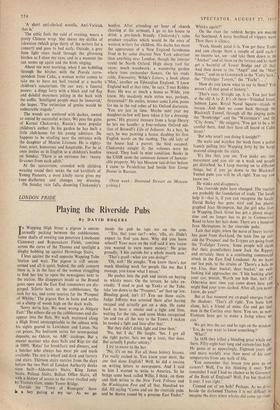From the Soviet Writers' Village
By DE'SMOND STEWART
pum more than churches build our western idea of a village, and, lacking a pub or a cafe, Pcridelkino, possessor of a fourteenth-century
church, does not seem a village. Fifteen miles from Moscow, it is a stretch of silver birches, limes and lilacs, a writers' Walden. Pasternak spent his last years here; he was buried in one of the cot-like tombs of the sloping graveyard.
Here in the summer Moscow writers come to breathe country air and rest from their urban engagements; some with small apartments and no maids find the Writers' Resthouse convenient luxury; full board costs about /40 per month. A fast electric train brings you, or, if you can get
one, a taxi. Invited by the Writers' Union to spend, if I wished, a month as their guest at the Writers' Resthouse, I came in a Zim, escorted by an energetic, talkative woman official. I was trepidant as the silver birches led to a gateway to see what would lie behind it. The concept of a writers' resthouse seemed to me, English, a contradiction: the proximity of other writers would be lethal to rest. Beer-tankard I could imagine quarrelling with impudent wineglass; fracas of more interest to the News of the World than to the pages of the Spectator might result from such cohabitation. Would the resthouse prove a sanatorium, a run-down spa, a nexus of nissen huts, an emergency hospital? My thoughts ran on these clinical lines because my right knee was bail-burning, the psychosomatic issue of a turbulent unconscious., The Zim stops by a building reminiscent of the architecture of the Deep South: a Greek portico for Mourning Becomes Electra. The architrave with its Soviet emblem proclaims the year of building: 1955.
I am shown to my room by a pretty blonde hostess. It consists of a comfortable bed, a sofa, a well-equipped desk, a wardrobe, a plugless wash-basin with -.t.)t and cold water and a door lined with bulging leatherette, the equivalent of an Oxford 'oak.' The window looks on to a grove were dachas and kiosks (like those for bands in German parks) are scattered through an undergrowth of dandelions. The writers, not yet changed from fauna to individuals, are 'resting'; reading in the kiosks, wandering under straw hats through the dappled sunshine or gossiping op benches.
My first engagement is to go into the dining- room and choose from a typed menu what I will eat on 'Wednesday. While I am thus brooding on tomorrow's diet, I am offered breakfast, but, as it is noon, decline. My helpful guide accepts an immediate cutlet while I jab at the generous menus (each course has four choices) rather as punters jab at Chelsea or Aston Villa. Breakfast, as well as lunch and dinner, has its three courses.
For lunch (my companion having returned to guide the authoress of Heatwate in Berlin round Moscow) I share my table with a critic and a philosopher. The critic, Eugenia Knipovich, speaks French and German; she has recently published a much-discussed essay on Kafka, now becoming available to Soviet readers. She has eyes of startling blue in a face that looked on the Russian 'twenties. Like everyone I meet in the period of After-Stalin, she speaks with reverence of Lenin. The philosopher (from Moscow University) is Professor Asmus, who tells me he has recently written the foreword to a translation Of Wittgenstein's Tractatus. In Moscow I had heard that Norman Lewis's ex- cellent Guatemalan novel, The Volcanoes Above Us, was coming out in an edition of six million. Apprehensively, I asked Asmus how many copies of the Traclatus were printed. The answer was philosophic and reassuring: 'Three thousand.'
The dining-room fills up, some tables being taken by husbands and wives, some by groups of writers. The appetites of the writers are healthy, their manners having the dignity of middle-aged drinkers of spa-water long before Gorki, the atmosphere the decorum of Russian public living. Nothing hearty, no uncultured beer-swilling. Alcohol is allowed (I brought tivo bottles of wine from Moscow), but not provided. There are both table napkins and paper servi- ettes: napkin rings also. The white tablecloths are covered with cellophane. The pictures on the walls are still-lifes of flowers and vegetables. My meal consists (with red Moldavian wine) of help-yourself raw, vegetables from a sideboard, maid-served fish-cake, cheese pie, stewed prunes, delicious sour milk and a final glass of tea in a metal silver-seeming holder.
I snooze, write, then limp as fast as my boil lets me through the woods, take a shower, dine and am then approached by Vladimir Belayev, a handsome veteran of the Second World War. He tells me in fumbling English how he drank much gin and whisky with English and American sailors at Murmansk.
'What are you writing now?' I ask. 'A short anti-clerical novella. Anti-Vatican, that is.'
The critic feels the cold of evening, wears a pretty Chinese wrap. She shares my dislike of television (which grips thirty of the writers for a concert) and goes to bed early. Outside, a grey June light stays lucid through the glistening birches as I close my eyes, and in a moment the sun seems up again and the birds singing.
About ten next morning, when I am hobbling through the birches with the Pravda corre- spondent from Cuba, a woman writer comes to take me to have my boil treated at a nearby children's sanatorium. On our way, a funeral passes: a dingy lorry with a black and red flag and doleful mourners jolting in the back with the coffin. 'Intelligent people must be immortal,' she hopes. 'The extinction of genius would be unbearable tragedy.'
The woods are scattered with dachas, owned or rented by successful writers. We pass the gates of Kornei Chukovsky, Russia's most popular children's author. In his garden he has built a little club-house for his young admirers. He happens to be strolling near the entrance with the daughter of Maxim Litvinov. He is eighty- four, erect, humorous and hospitable. For he at once invites us in English to a children's bonfire on Sunday. 'There is an entrance fee: twenty fir-cones from each adult.'
At the sanatorium, crowded with children wearing round their necks the red kerchiefs of Young Pioneers, a most kindly nurse gives my knee diathermy and changes my dressing.
On Sunday rain falls, dooming Chukovsky's
bonfire. After attending an hour of church (leaving at the sermon), I go to his house to drink a pre-lunch brandy. Chukovsky's sales produce royalties which would be the envy of western writers for children. His dacha has more the appearance of a New England farmhouse lived in by some discreet New York advertiser than anything near London, though the interior could be North Oxford. High sharp roof for snow; much woodwork; a wandering garden where trees outnumber flowers. On his study table, Encounter, Wilde's Letters, a book about V.'Max,' another on Edwardian England.3 knew England well at that time,' he says. 'I met Robbie Ross. He was as much a homo as Wilde, you know. My maidenly male virtue was, perhaps, threatened?' He smiles, intones some Latin, poses for me in the red robes of his Oxford doctorate. 'You are just in time. Maybe next year my daughter-in-law will have taken it for a dressing- gown.' His greatest treasure from a large library he lets me handle: a four-volume Oxford edi- tion of Boswell's Life of Johnson. As a boy, he says, he was painting a house, daubing his first English words on the roofing. The old lady of the house had a parrot; the bird escaped; Chukovsky caught it; the volumes were his reward. They look in mint condition. Books in the USSR seem the summum bonum of honour- able property. My last Moscow taxi-driver before I came to Peridelkino had beside him Lorna Donne in Russian.
(Next week : Desmond Stewart on Moscow .writing.)































 Previous page
Previous page